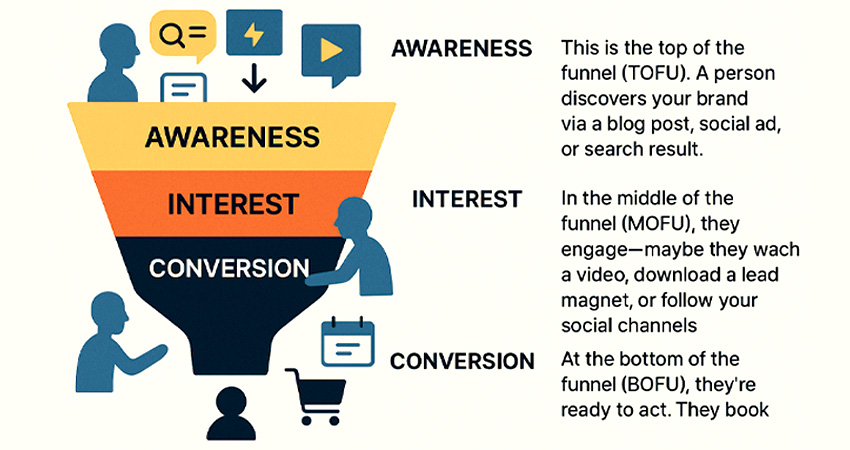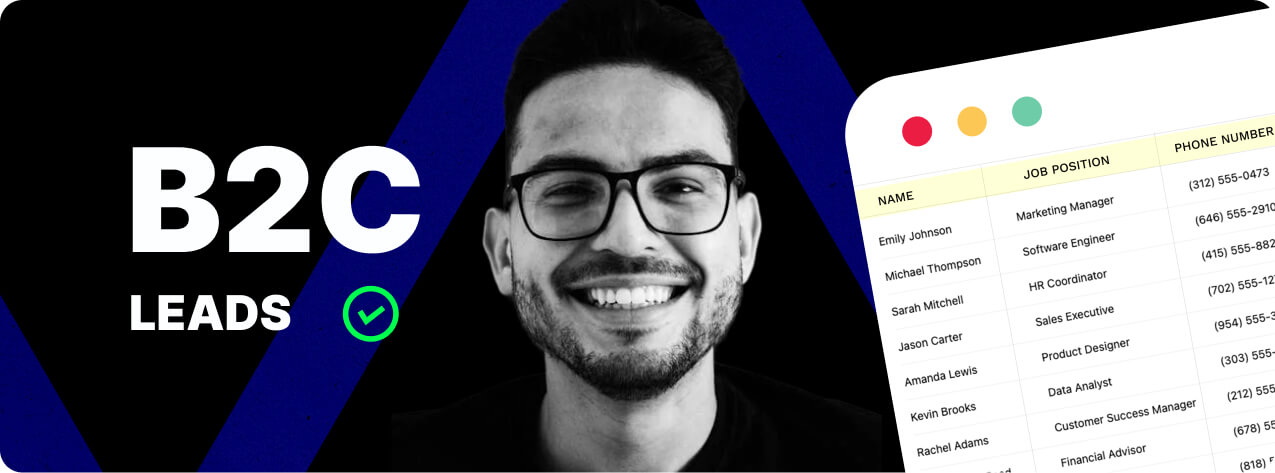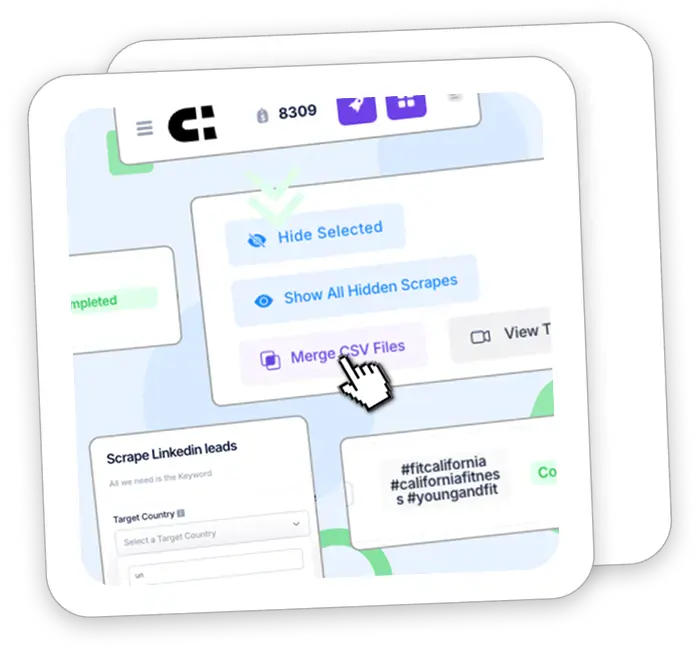Lead Generation Guide: Strategies & Tools for 2025

This lead generation guide will show you how to turn curiosity into opportunity — with proven strategies to attract and convert leads in 2025.
It’s the first step in growing your business—by getting the attention of people who are genuinely interested in what you offer. Whether someone downloads a free resource, fills out a contact form, signs up for your newsletter, or replies to your message, that moment of engagement makes them a lead.
These are people who’ve said, “Hey, I’m listening.” And that’s your chance to start a conversation. You might also want to check our Lead Scraper page to learn how to get high-quality leads.
Lead generation is the process of attracting interest and converting that into revenue opportunities.
What Is Lead Generation & Why It Matters?

This lead generation guide explains the tactics that help you build long-term relationships with leads who convert. It helps you build real relationships with potential customers, so when they’re ready to buy, they’re already thinking of you. And in today’s digital landscape, knowing how to generate leads online is key to staying ahead of the competition. One of the easiest ways to find leads is to scrape them through a reliable tool.
Why does it matter today more than ever?
Because attention is the new currency. If you’re not consistently bringing in new prospects, your business is standing still — or worse, shrinking.
“If you’re not generating leads, you’re not growing.”
Lead generation isn’t just a marketing tactic: it’s the oxygen of modern business growth.
Advantages of Leads Online vs. Offline
While traditional lead generation methods like trade shows or print ads still exist, digital lead gen offers powerful advantages:
- Speed – Online tools let you reach hundreds or thousands of potential leads instantly. You can set up a campaign in the morning and have leads rolling in by the afternoon.
- Lower Cost – Compared to offline methods like direct mail or cold calling centers, digital outreach (emails, ads, social posts) is way more cost-effective — especially when scaled.
- Instant Communication – With email tools and CRMs, you can immediately send cold emails, schedule follow-ups, and track engagement in real-time. No waiting days for callbacks or snail mail replies.
Digital lead gen is fast, scalable, and gives you real-time data — three things offline methods just can’t compete with.
The Lead Generation Funnel Explained
Tailor your funnel messaging to highlight the value of your product or service at each stage.
The lead generation guide emphasizes the need for seamless handoffs between awareness, interest, and conversion. This lead generation guide explains every stage of the funnel, every stage of the funnel has tools and tactics that can dramatically increase conversion. The lead generation funnel is all about turning total strangers into interested prospects and eventually, into customers. Here’s how it typically works:
- Awareness – This is the top of the funnel (TOFU). A person discovers your brand via a blog post, social ad, or search result.
- Interest – In the middle of the funnel (MOFU), they engage and maybe they watch a video, download a lead magnet, or follow your social channels.
- Conversion – At the bottom of the funnel (BOFU), they’re ready to act. They book a call, sign up, or make a purchase.
Throughout the funnel, you can use touchpoints like:
- Website forms
- Cold email outreach
- Webinars or live events
- Retargeting ads
- Chatbots or live chat
The goal? Smoothly guide each lead from curiosity to conversion.
Types of Lead Generation
In this lead generation guide, we break down both methods so you can decide which works best for your audience and growth goals. Let’s chop them up and make sense of each.
Inbound Lead Generation
Inbound lead generation focuses on attracting leads organically through SEO, content, and social engagement. This focuses on drawing people in naturally. It includes:
- SEO to rank for queries your target audience searches– Ranking your site for key searches like “best CRM for small business”
- Content marketing – Blog posts, videos, or guides that educate and build trust
- Social media – Posts that drive engagement and direct traffic to your site
Example: A real estate agent posts a YouTube video on “Top 5 Things to Know Before Buying Your First Home,” and viewers visit her site to download a free checklist.
When publishing blog content, following SEO best practices for inbound marketing helps your site attract organic leads.
Outbound Lead Generation
This is more proactive: you go out and find your leads. It includes:
- Cold email – Sending personalized outreach to targeted prospects
- Cold calling – Reaching potential leads directly by phone
- Paid ads – Running PPC or social ads targeting your ideal customer
Example: A SaaS company scrapes data from LinkedIn, finds marketing managers at startups, and sends them personalized emails offering a free trial.
Both methods work. The key is knowing when to use each based on your audience and goals.
Top Online Lead Generation Channels in 2025
The digital landscape continues to evolve, but these core channels remain highly effective for lead generation, with companies using dedicated tools reporting up to a 451% increase in qualified leads.
Email Marketing
Email continues to deliver the highest ROI across digital marketing. With a solid email list and strategic automation, you can consistently convert cold prospects into qualified leads.
Landing Pages
Landing pages are focused, conversion-driven web pages designed to collect visitor information. Whether tied to an ad or content offer, a well-optimized landing page can dramatically boost lead volume.Make sure your lead capture forms request basic information like name, email address, and company role.
SEO & Content Marketing
Creating valuable, search-optimized content helps you rank in Google and build trust with your audience. Over time, this pulls in a steady flow of organic leads without paid ads.
LinkedIn & Other B2B Social Platforms
Platforms like LinkedIn are ideal for B2B lead generation. Building an audience, running targeted outreach, or posting thought leadership content can spark direct conversations and connections.
Paid Advertising
Google Ads, Meta, and LinkedIn Ads give you access to highly specific audiences. While it requires budget, paid traffic combined with the right funnel can yield strong results quickly.
Lead Generation Strategies You Can Use in 2025
These strategies are helping businesses break through the noise and consistently capture quality leads:
Gated Content
Offering something valuable, like a whitepaper, checklist, or template, in exchange for contact info is still one of the most effective tactics for generating qualified leads.
Live Chat and Chatbots
Instant engagement tools on your site can capture leads while they’re most interested. Live chat answers questions in real-time, while chatbots automate lead collection 24/7. A clear CTA not only drives clicks, but also qualifies leads by signaling genuine interest.
Lead Scoring and Segmentation
Understanding the types of leads (cold, warm, hot) helps you personalize your approach.
Not all leads are equal. Assigning scores based on engagement or fit helps your sales team focus on the hottest opportunities first. Segmentation also lets you tailor follow-ups more effectively. A service qualified lead (SQL) is someone who has spoken with your support or service team and is ready to talk to sales.
A/B Testing and Funnel Optimization
Small tweaks in your copy, subject lines, or CTAs can lead to big gains. Regularly testing and improving every step of your funnel is key to maximizing lead volume and quality.Use remarketing tools to re-engage visitors who’ve shown interest but didn’t convert.
Scraping
Web scraping is the automated process of collecting publicly available data from websites. When used ethically and legally, it allows businesses to gather relevant lead data, such as contact info, social profiles, or business details at scale.
Top Tools in This Lead Generation Guide
This lead generation guide includes the top tools to scale prospecting across platforms like LinkedIn, Google Maps, and Instagram. There are countless tools on the market, but these stand out for effectiveness, features, and value which makes them perfect for any lead generation guide aiming to scale smartly:
IGLeads.io – Your Go-To Scraping & Prospecting Tool
We built IGLeads because we were drowning in manual prospecting too. And now? Thousands of users — from real estate agents to local marketers and even Instagram growth experts — use it to generate fresh, targeted leads from platforms like Google Maps, Instagram, and more.
No messy spreadsheets. Just clean, exportable data in seconds.
It’s our product, and we fully stand behind it — because it works.
Seriously, it’s stupidly simple to use and saved us hours of work every week.
Try it once and you’ll never go back to scraping manually again.
What channels can IGLeads scrape?
- TikTok
- YouTube
- Google Maps
- Real estate platforms
Why it matters:
Instead of manually researching profiles or paying for ads, IGLeads helps you build targeted lead lists instantly — so you can spend more time closing, less time searching. In fact, leads-based email generation, like what IGLeads enables, delivers an average ROI of 3,600% — that’s $36 for every $1 spent.
Apollo.io – B2B Prospecting with Built-in Outreach
Apollo combines lead data with outbound automation. It’s made for sales teams that want verified contacts, advanced filters, and smart email sequences — all in one dashboard.
What does Apollo offer?
- 275M+ contact database
- Verified email addresses
- Chrome extension for LinkedIn
- Built-in email sequencing & calling tools
- CRM integrations (HubSpot, Salesforce, etc.)
Why it matters:
You don’t just find leads. You also engage them right from Apollo. It’s a complete sales engine, especially strong for B2B outreach.
Hunter.io – Find & Verify Professional Emails
Hunter is all about email accuracy. Pop in a domain, and it finds the right people behind the scenes. Clean, fast, and super useful for email list building.
What does Hunter offer?
- Domain search for public emails
- Email verification tool
- Chrome extension
- Cold email campaigns
- Integrations with Google Sheets & CRMs
Why it matters:
No more guessing email formats. Hunter makes it easy to identify decision-makers and reach out with confidence.
Lemlist – Personalized Cold Email That Gets Replies
Lemlist is more than an email tool. It’s designed to help you stand out. With dynamic images, videos, and personalized text, your emails feel human, not robotic.
What does Lemlist offer?
- Cold email campaigns
- Dynamic personalization (text + visuals)
- Deliverability boosting tools
- Campaign warm-up feature
- CRM & Zapier integrations
Why it matters:
It’s perfect for those who care about open and reply rates. Lemlist helps your messages actually feel like 1-to-1 conversations.
Apify – Custom Web Scraping for Anything Online
If you need data from a website, any website, Apify probably has a solution. It’s highly customizable and ideal for teams that want deep or large-scale scraping.
What does Apify offer?
- Ready-made and custom “actors” (bots)
- Browser automation with Puppeteer & Playwright
- Data delivery via API or cloud storage
- Scheduling & proxy rotation
- Developer-friendly but scalable
Why it matters:
For complex scraping jobs or big datasets, Apify is a beast. It gives you full control over what data you want and how you get it.
PhantomBuster – Social Media Automation for Prospecting
PhantomBuster connects to your social media accounts and automates actions like following, messaging, and extracting leads — all without writing a line of code.
What does PhantomBuster offer?
- Automation on LinkedIn, Instagram, Twitter, and more
- Lead extraction from social platforms
- Scheduling & chained workflows
- Browser-based with cloud execution
- Pre-built Phantoms (bots)
Why it matters:
It’s like having a digital assistant who works around the clock on social prospecting. Great for growth marketers and solo founders.
Octoparse – No-Code Scraping for Any Website
Octoparse brings web scraping to non-techies. You can point, click, and extract structured data from almost any site — no coding needed.
What does Octoparse offer?
- Drag-and-drop interface
- Templates for common sites
- Cloud & local extraction modes
- Scheduled scraping
- Export to Excel, CSV, API
Why it matters:
Anyone can become a data pro with Octoparse. It’s ideal for marketers, researchers, and business owners who need info fast.
Lead Generation Tools Compared
Here’s a quick side-by-side comparison of the top lead generation tools to help you choose the one that best fits your workflow and goals.
| Tool | Best For | Channels / Data Sources | Standout Feature | Ideal For |
| IGLeads.io | Multi-platform scraping & prospecting | Instagram, TikTok, YouTube, Google Maps, Facebook, LinkedIn | No code scraping | All professionals can scrape |
| Apollo.io | B2B lead generation with outreach | Internal B2B database, LinkedIn (via extension) | Email sequencing + verified leads | Sales teams, SaaS founders |
| Hunter.io | Email finding & verification | Company domains, websites | Domain search + verification tool | Email marketers, recruiters |
| Lemlist | Personalized cold email campaigns | Email outreach (no scraping) | Visual + dynamic personalization | Cold email pros, growth teams |
| Apify | Custom, large-scale web scraping | Any public website | Custom “actors” + full dev flexibility | Data teams, technical marketers |
| PhantomBuster | Social media automation & lead gen | LinkedIn, Instagram, Twitter, Facebook | Pre-built social bots (Phantoms) | Growth hackers, solopreneurs |
| Octoparse | Beginner-friendly web scraping | Any website | No-code, visual scraping interface | Non-coders, ecomm researchers |
Using This Lead Generation Guide for Different Company Types
Lead generation looks very different depending on the size and type of your company. Let’s break it down:
Startups
Startups typically have lean teams and limited budgets, so speed and efficiency are everything. The focus is usually on building awareness and traction fast, often through outbound outreach, landing pages, and scraping targeted data from platforms like LinkedIn or Google Maps. That’s why lead generation tools are so valuable: while 61% of marketers rank lead generation as their biggest challenge, businesses using lead gen automation report 10%+ revenue increases within just 6 to 9 months.
Agencies
Marketing and sales agencies need to consistently attract qualified clients. For them, lead gen is about standing out in a crowded market, using content, cold outreach, and automation tools to scale prospecting while still offering a personal touch.
Enterprises
Large companies often prioritize quality over quantity. Enterprise lead generation is tied to long sales cycles and account-based marketing (ABM). Here, alignment between sales and marketing, proper segmentation, and CRM integration becomes essential.
B2B vs. B2C
- B2B lead generation is more strategic. It usually involves longer decision cycles, multi-touch outreach, and relationship building via channels like LinkedIn, email, or webinars.
- B2C lead generation focuses on speed, volume, and emotion: think landing pages, influencer partnerships, or Instagram campaigns to generate interest quickly.
Whether you’re running a startup or managing a large enterprise, the key is to align your lead generation strategy with your goals, resources, and audience behavior.
Real-Life Use Cases from This Lead Generation Guide
A powerful lead generation tool like a scraping platform doesn’t just help sales teams. It can support professionals across industries by extracting the right data to connect with the right people. Here’s how:
Sales People
Looking for direct contact info of decision-makers? Scraping platforms like IGLeads can help sales professionals find verified emails, phone numbers, and social profiles to build your pipeline fast.
Marketing Agencies
Need to pitch local businesses or niche service providers? Agencies can scrape data from platforms like Google Maps or Yelp to build a list of warm leads, and then plug them into automated campaigns.
Business Owners
A business owner might be looking for new customers, suppliers, or even employees. With scraping, you can find all three, whether it’s scraping Instagram followers in your niche or listing nearby competitors’ clients.
Fitness & Sports Professionals
A personal trainer can use local scraping tools to find fitness enthusiasts, gym members, or health-conscious individuals in a specific city, and then DM or email them directly.
Recruiters
Find potential candidates with specific skills by scraping LinkedIn or niche job boards. Combine that with company data to target passive talent in relevant industries.
Growth Marketers
Looking for a list of Shopify stores or SaaS founders? Scrapers can help you build hyper-targeted lead lists in record time, which is perfect for launching campaigns or product validation.
Real Estate Professionals
Real estate agents can target home buyers, sellers, or renters based on data scraped from platforms like Zillow, Facebook Groups, or even Instagram locations.
Nutrition Professionals
Use scraping to identify followers of local gyms, food influencers, or health-focused communities. It’s a great way to target people who already care about wellness.
The possibilities are endless. The right data gives you the edge — and scraping tools like IGLeads let you collect it at scale.
Avoid These Lead Generation Mistakes
Even with the best tools and strategies, many businesses still struggle with lead generation. Often, it’s because they fall into one (or more) of these traps:
Generic Messaging
Generic outreach fails. In 2025, AI-powered personalization is essential. Tools like ChatGPT and Lavender auto-generate cold emails based on prospects’ digital footprints, increasing replies by 20-30%. Sales platforms like Apollo.io now offer AI personalization at scale, automatically referencing job changes, funding rounds, and tech insights without sacrificing efficiency.
Example: Visum’s Cold Email Campaign
Visum, a software company, initially relied on generic cold emails, resulting in low engagement. After adopting personalized outreach strategies, they significantly improved their response rates.
No Clear CTA
Every piece of content or message should guide the lead to take action — whether that’s booking a call, downloading a guide, or replying to an email.
Example: HubSpot’s A/B Testing of CTAs
specific CTAs like “Download our free SEO audit guide” outperformed vague ones such as “Learn more,” leading to higher click-through rates.
Poor Follow-Up
Most leads don’t convert on the first touch. Without a clear follow-up strategy, you’ll lose out on huge opportunities.
Example: Acme Advisors & Brokers’ Email Strategy
Acme Advisors & Brokers, using Mailshake, improved their cold email reply rate from 9.8% to 18% by implementing a structured follow-up sequence and refining their messaging based on feedback.
Overreliance on One Channel
Don’t put all your eggs in one basket. Diversify your lead generation efforts across email, content, social, and outbound scraping to reduce risk and maximize reach.
Example: Cognism’s Diversified Lead Generation
Cognism initially focused heavily on LinkedIn Ads for lead generation. Recognizing the risks of relying on a single channel, they diversified their strategy to include email outreach, events, and content syndication, resulting in a 4x increase in demo bookings over six months.
How to Build a Lead Generation System
This section outlines a step-by-step lead generation strategy that you can apply to any niche or business type. In this lead generation guide, we’ll walk through the exact steps you need to build a scalable system.
One-time campaigns won’t cut it. To generate leads consistently, you need a repeatable system. Here’s how to build one:
1. Set Your Lead Goals
Decide what success looks like. How many leads do you want per week or month? What’s your ideal cost per lead (CPL)? Define your volume, quality, and timeline.
2. Pick the Right Channels and Tools
Depending on your niche and audience, choose where and how to engage. For fast, targeted outreach, scraping tools like IGLeads.io are essential, especially if you want to bypass slow organic growth.
3. Create Irresistible Offers
Lead magnets like free guides, checklists, templates, or discounts can dramatically boost conversion rates — especially when they solve real pain points your prospects are struggling with.
4. Build Your Funnel
Set up the full path:
- Awareness (content, ads, outreach)
- Interest (landing pages, DMs, email opens)
- Conversion (form submissions, bookings, sales)
5. Nurture & Follow-Up
Use email sequences, remarketing, or live chat to stay top of mind and build trust. Most leads need 5+ touches before taking action. Many prospects aren’t ready to buy on first contact — nurturing sequences are key.
6. Optimize and Scale
Track your results, test new angles, and double down on what works. As you grow, automate where possible and explore new segments or scraping targets.
Pro Tip: IGLeads lets you export lead data in CSV format and integrate it directly into your CRM or outreach tool, so you can take immediate action without messy spreadsheets or manual entry.
Every strategy in this lead generation guide is designed to help you scale without losing personalization
Explore more lead generation strategies and tools
- B2B Lead Generation Solutions – Guide for 2025
- How to Build a High-Quality B2B Email List for Outbound Marketing
- Buy Email Lists for Marketing in 2025: Complete Guide to Business Leads
- Why Scrape Google Maps? Use Cases for Sales, Marketing & SEO
- B2C Lead Generation: The 2025 Playbook
- 15 Best Lead Generation Companies for 2025
- Best B2B email list providers in 2025
- Top Lead Generation Agencies Compared (2025)
- 18 Best B2B Lead Generation softwares in 2025
Find your email list by industry
- Get Fresh Veterinarians Email List 2025
- Get Fresh Chief Revenue Officers Email List 2025
- Get Fresh Banking Email List 2025
- Get Fresh Real Estate Email List 2025
- Get Fresh VP Email List 2025
- Get Fresh Retail Industry Email List 2025
- Get Fresh Chief Sales Officer Email List 2025
- Get Fresh Hospitals Email List 2025
- Get Fresh Healthcare Email List 2025
- Get Fresh Restaurant Email List 2025
- Get Fresh Chiropractors Email List 2025
- Get Fresh Hotels Email List 2025
- Get Fresh COO Email List 2025
- Get Fresh Contractors Email List 2025
- Get Fresh IT Decision Makers Email List 2025
- Certified Public Accountants Email List 2025
- Get Fresh Real Estate Agents Email List 2025
- Get Fresh Insurance Agents Email List 2025
- Get Fresh Mining Industry Email List 2025
- Get Fresh Chief Information Officers Email List 2025
- Get Fresh Pharmacists Email List 2025
- Engineers Email List: Reach Your Target Audience with Precision
- Get Fresh Mortgage Brokers Email List 2025
- Get Fresh HR Email List 2025
- Get Fresh Attorneys Email List 2025
- Oil And Gas Industry Email List 2025
- Chief Marketing Officer Email List 2025
- Email Extractor Ultimate Guide 2025
- CFO Email List – Get Targeted CFO Contacts in 2025
- How to Get a Homeowner Mailing List in 2025?
- Realtor Email List 2025
- Dentists Email List 2025
- Get Fresh CEO Email List 2025
- Marketing Directors Email List: How to Build and Use One for Your Business
Any Questions?
Lead generation is the process of attracting and converting strangers into potential customers through online channels like SEO, content, email, and ads.
Without leads, there are no sales opportunities. Lead gen is essential for building predictable revenue and scaling any business, whether B2B or B2C.
Inbound focuses on drawing people in (via content, SEO), while outbound involves proactive outreach (emails, cold calls, ads).
Key metrics include conversion rate, cost per lead, lead quality score, and sales conversion rates.
A lead magnet is a free resource (like a checklist, guide, or tool) offered in exchange for contact information.
Some top tools include IGLeads, Apollo, Lemlist, Hunter, and Pipedrive—depending on your needs.
It depends on your sales funnel and conversion rates, but a consistent and scalable pipeline is more important than sheer volume.
Yes! Tactics like SEO, cold outreach, social selling, and email marketing can work incredibly well—especially with the right tools.
Use factors like industry, company size, engagement level, and decision-making power to assign lead scores and focus on the most promising prospects.
IGLeads simplifies data collection and prospecting by pulling high-quality lead data from platforms like Instagram, LinkedIn, and Google Maps—saving you time and money on manual outreach.











